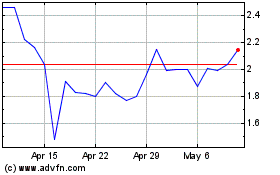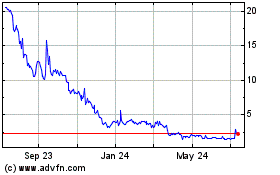180 Life Sciences Provides Follow-Up Information on Oxford University and the Company’s Successful Dupuytren’s Phase 2b Clinical Trial Results
December 06 2021 - 8:15AM

180 Life Sciences Corp. (NASDAQ: ATNF) (“180 Life Sciences” or the
“Company”), a clinical-stage biotechnology company focused on the
development of novel drugs that fulfill unmet needs in inflammatory
diseases, fibrosis and pain, today provided follow-up information
on the top line results of Oxford University and the Company’s
Phase 2b clinical trial for Dupuytren’s disease announced on
December 1, 2021.
Dr. James Woody, 180 Life Sciences Chief Executive Officer,
stated, “We believe the Phase 2b clinical trial for Dupuytren’s
disease using adalimumab was a phenomenal achievement, having met
both primary and secondary endpoints by significantly diminishing
the hardness and size of the Dupuytren’s nodules, respectively. We
believe these results affirm our team’s scientific and clinical
expertise and fundamentally position us to be a major leader in
fibrosis therapies.”
Both the primary and secondary clinical trial endpoints from the
Phase 2b clinical trial for patients with early-stage Dupuytren’s
were statistically significant. Further, patients enrolled in the
clinical trial exhibited a high compliance rate; almost all of them
returned for all injections, and experienced no related serious
adverse events. With approximately 1 in 10 Phase 2b clinical trials
for new indications typically succeeding, this positive outcome
allows the Company to move closer towards potential
commercialization of a much-needed therapy with no currently
approved treatment.
However, due to the strict disclosure policies of the
prestigious clinical journals, which only permit limited data to be
released at closed scientific meetings, the Company is unable at
this time to release the entire data set with information that it
believes would provide greater clarity around the results. Any
further disclosures of the clinical data may disqualify the trial
from publication, a situation the Company wishes to avoid. Although
publication may be several months away as the peer review process
typically involves several iterations of questions and
clarifications, publication in a peer-reviewed journal will lend
significant credence to the work and represent significant progress
in the field of Dupuytren’s disease. Professor Nanchahal has
already submitted the manuscript to a preeminent clinical
journal.
The Company believes it is in an enviable position, with the
opportunity to capitalize on the clinical trial results and
continue to work towards bringing what it hopes will be a highly
efficacious and safe product to market for an unmet need. To its
knowledge this is the first rigorous randomized,
placebo-controlled, double-blinded trial for preventing the
progression of Dupuytren’s disease. The Company is not aware of any
competitors for targeted therapies for early-stage Dupuytren’s
disease, and currently possesses rights in connection with a
robust, worldwide intellectual property portfolio.
The Company has engaged Kinexum as regulatory consultants to
assist in discussions with the U.S. Food and Drug Administration
(FDA) and the UK equivalent, the Medicines and Healthcare products
Agency (MHRA), to help determine the optimal path forward to
commercialization, with initial meetings currently planned for 1H,
2022. Since 2003, Kinexum has been helping clients through the
pre-clinical, clinical, CMC development and regulatory process for
product candidates targeting a broad range of therapeutic areas
through a broad set of modalities.
Forward-Looking Statements
This press release includes "forward-looking statements",
including information about management’s view of the Company’s
future expectations, plans and prospects, within the safe harbor
provisions under The Private Securities Litigation Reform Act of
1995 (the “Act”). Words such as “expect,” “estimate,” “project,”
“budget,” “forecast,” “anticipate,” “intend,” “plan,” “may,”
“will,” “could,” “should,” “believes,” “predicts,” “potential,”
“continue” and similar expressions are intended to identify such
forward-looking statements. These forward-looking statements
involve significant risks and uncertainties that could cause the
actual results to differ materially from the expected results and,
consequently, you should not rely on these forward-looking
statements as predictions of future events. These forward-looking
statements and factors that may cause such differences include,
without limitation, statements regarding adalimumab’s potential as
a treatment for Dupuytren’s disease; the top-line data 180 Life
Sciences has reported is based on preliminary analysis of key
efficacy and safety data, and such data may change following a more
comprehensive review of the data related to the clinical trial and
such top-line data may not accurately reflect the complete results
of the trial, and that regulators, including the FDA, may not agree
with 180 Life Sciences’ interpretation of such results; the
uncertainties associated with the clinical development and
regulatory approval of 180 Life Sciences’ drug candidates,
including potential delays in the enrollment and completion of
clinical trials; the potential that earlier clinical trials and
studies may not be predictive of future results; 180 Life Sciences’
reliance on third parties to conduct its clinical trials, enroll
patients, and manufacture its preclinical and clinical drug
supplies; unexpected adverse side effects or inadequate therapeutic
efficacy of drug candidates that could limit approval and/or
commercialization, or that could result in recalls or product
liability claims; 180 Life Sciences’ ability to fully comply with
numerous federal, state and local laws and regulatory requirements,
as well as rules and regulations outside the United States, that
apply to its product development activities; current negative
operating cash flows and a need for additional funding to finance
our operating plans; the terms of any further financing, which may
be highly dilutive and may include onerous terms; statements
relating to expectations regarding future agreements relating to
the supply of materials and license and commercialization of
products; the availability and cost of materials required for
trials; the risk that initial drug results will not be able to be
replicated in clinical trials or that such drugs selected for
clinical development will not be successful; challenges and
uncertainties inherent in product research and development,
including the uncertainty of clinical success and of obtaining
regulatory approvals; uncertainty of commercial success; the
inherent risks in early stage drug development including
demonstrating efficacy; development time/cost and the regulatory
approval process; the progress of our clinical trials; our ability
to find and enter into agreements with potential partners; our
ability to attract and retain key personnel; changing market and
economic conditions; our ability to produce acceptable batches of
future products in sufficient quantities; unexpected manufacturing
defects; manufacturing difficulties and delays; competition,
including technological advances, new products and patents attained
by competitors; challenges to patents; product efficacy or safety
concerns resulting in product recalls or regulatory action; changes
in behavior and spending patterns of purchasers of health care
products and services; changes to applicable laws and regulations,
including global health care reforms; expectations with respect to
future performance, growth and anticipated acquisitions; the
continued listing of the Company on The NASDAQ Stock Market;
expectations regarding the capitalization, resources and ownership
structure of the Company; expectations with respect to future
performance, growth and anticipated acquisitions; the ability of
the Company to execute its plans to develop and market new drug
products and the timing and costs of these development programs;
estimates of the size of the markets for its potential drug
products; potential litigation involving the Company or the
validity or enforceability of the intellectual property of the
Company; global economic conditions; geopolitical events and
regulatory changes; the expectations, development plans and
anticipated timelines for the Company's drug candidates, pipeline
and programs, including collaborations with third parties; access
to additional financing, and the potential lack of such financing;
and the Company’s ability to raise funding in the future and the
terms of such funding. These risk factors and others are included
from time to time in documents the Company files with the
Securities and Exchange Commission, including, but not limited to,
its Form 10-Ks, Form 10-Qs and Form 8-Ks. These reports and filings
are available at www.sec.gov. All subsequent written and oral
forward-looking statements concerning the Company, the studies
described herein or other matters and attributable to the Company
or any person acting on its behalf are expressly qualified in their
entirety by the cautionary statements above. Readers are cautioned
not to place undue reliance upon any forward-looking statements,
which speak only as of the date made, including the forward-looking
statements included in this press release, which are made only as
of the date hereof. The Company cannot guarantee future results,
levels of activity, performance or achievements. Accordingly, you
should not place undue reliance on these forward-looking
statements. The Company does not undertake or accept any obligation
or undertaking to release publicly any updates or revisions to any
forward-looking statement to reflect any change in its expectations
or any change in events, conditions or circumstances on which any
such statement is based, except as otherwise provided by
law.
Investors:
Jason AssadDirector of IR180 Life Sciences Corp(678)
570-6791Jason@180lifesciences.com
Media Relations:
Russo PartnersDavid SchullDavid.Schull@russopartnersllc.com(212)
845-4271
180 Life Sciences (NASDAQ:ATNF)
Historical Stock Chart
From Mar 2024 to Apr 2024

180 Life Sciences (NASDAQ:ATNF)
Historical Stock Chart
From Apr 2023 to Apr 2024
